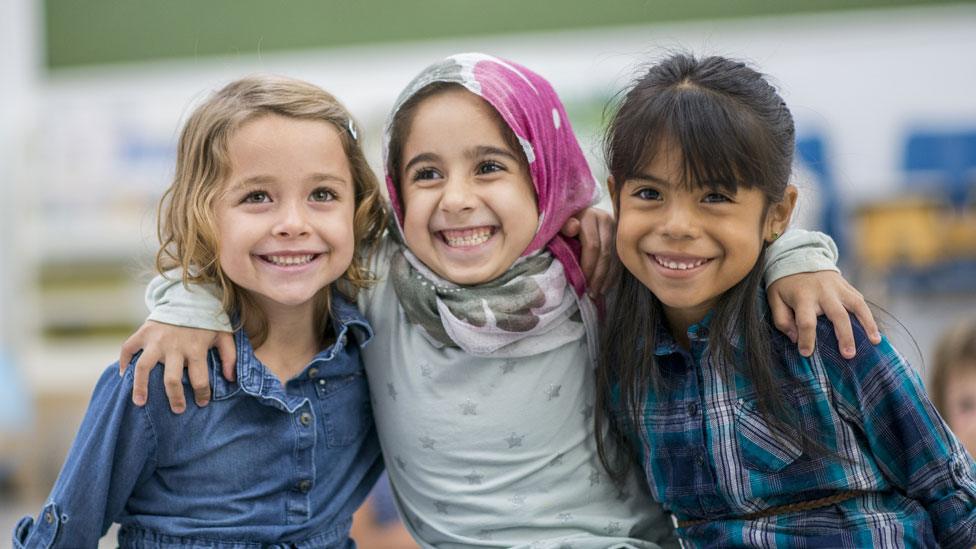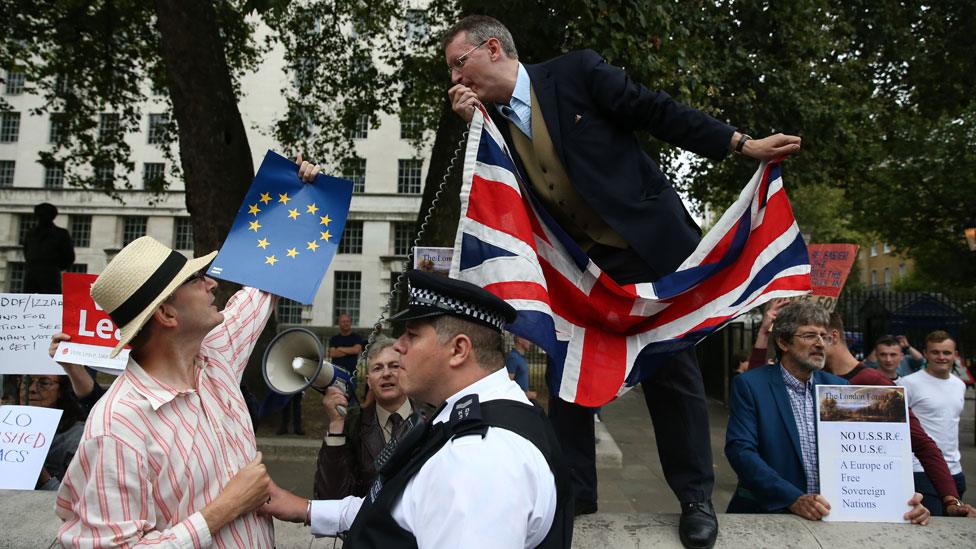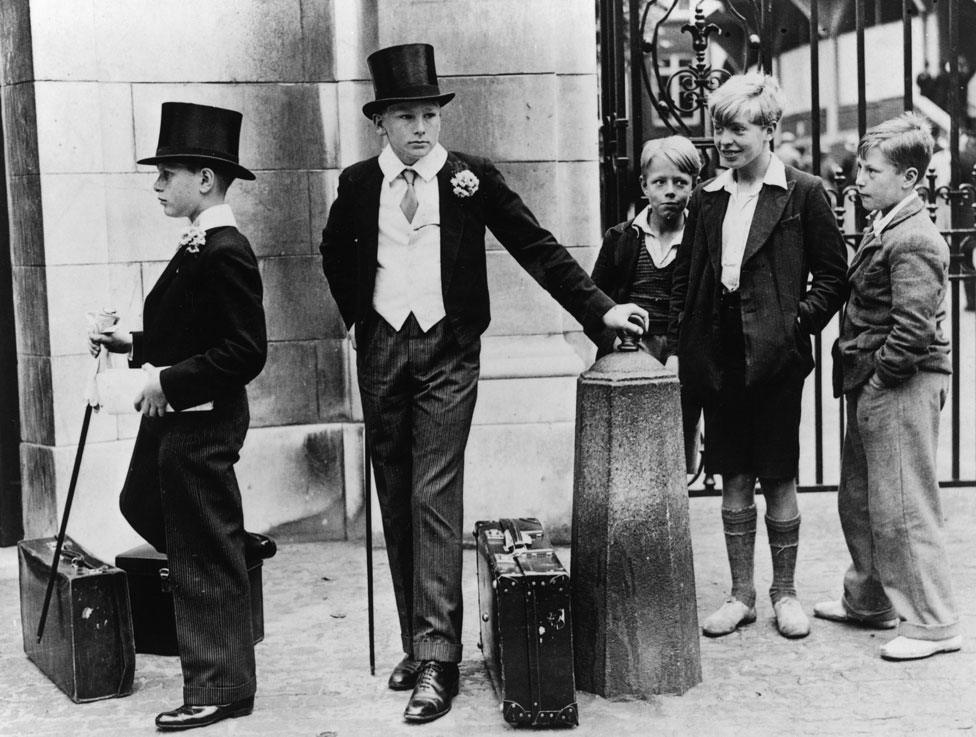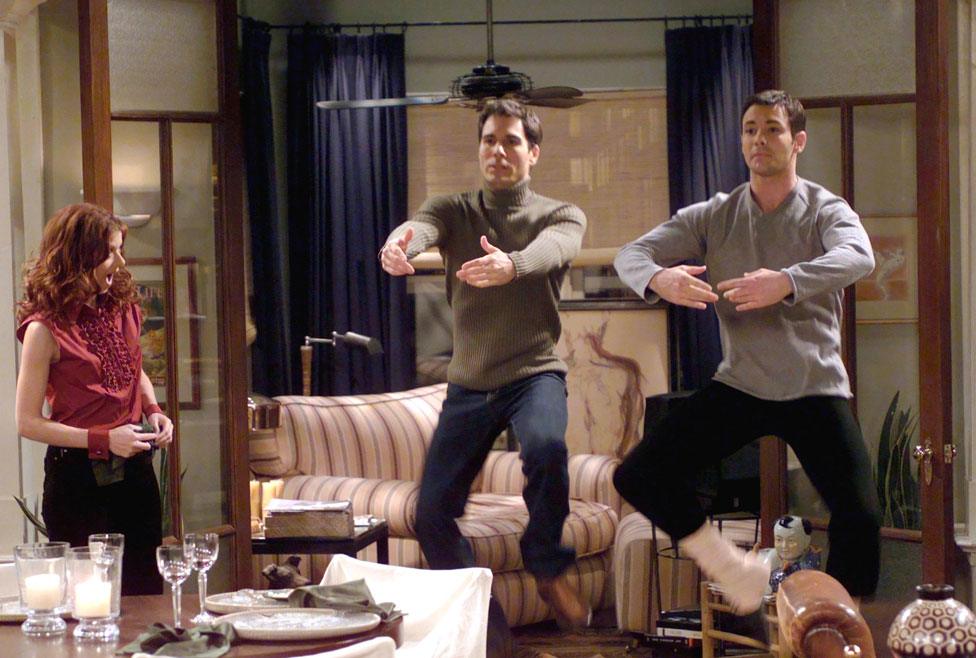Crossing Divides: The benefits of having friends who aren't 'just like us'
- Published

Having a strong network of friends has many advantages, from offering support when we are down, to a group we can share our thoughts with. But could we be missing out if we only mix with people "just like us"?
For most of us, the people we see on a regular basis - our social network - are a defining part of our lives.
Friends help us understand our place in the world and research shows that strong friendships are associated with reduced anxiety, external.
But there is a growing body of evidence that suggests people tend to make friends with people who are similar to them.
It may well be that we could all benefit from widening the circles we move in. For example, mixing with a diverse set of people can stimulate creativity, external and benefits both the individual and society.
The impact that our social networks have on the strength of our opinions is an area that researchers are investigating.
The attitudes we hold most strongly guide the way we see the world and are more resistant to being changed by the persuasion of others.
Often, we seek out, process and retain information that confirms our views, while discarding information that disagrees with our opinions.
An example of this "confirmation bias" might be the way we listen to others' views on Brexit and whether we believe it is good, or bad, for the UK.
Most people are in social networks made up of like-minded people, whereas a small minority mix with people with a wider range of views.
As groups become more diverse, evidence suggests their members are more open to persuasion and their attitudes towards a particular issue become less entrenched, external.
In the case of Brexit, many of us may have had that "aha" moment, when we realised that just about everyone we knew held the same view as we did.
This is why, if you are a Remainer, you may have been amazed to learn the outcome of the referendum on the UK's membership of the EU.
If you were a Leaver, however, the result would have seemed much more obvious - after all, many of the people you know held that view.
It is a compelling example of a current dispute where people hold starkly different views.

Consequences can follow when people have such polarised positions.
The tendency of "birds of a feather to flock together" - a behaviour sociologists call homophily - often strengthens stereotypes about both our own group and those of others.
It can happen in many ways, for example children in school cafeterias grouping themselves, external by everything from ethnicity to less intuitively obvious characteristics like hairstyle and whether they wear glasses.
Soon, we can find our social world divided along lines of age, social class, political views, religion and race.
Additional psychological biases may then take over.
For example, we may see our own group as "better", external - for example, more interesting, entertaining, or informed - and other groups as less favourable.
In the worst cases, we can move from a slight preference for our own group to active dislike of others.
As groups move further apart, they can end up living in different neighbourhoods, attending different schools and believing different "facts".

Find out more:
The BBC's Crossing Divides series looks at stories about the ways that people connect in an increasingly polarised world
The series runs across BBC News from Monday 23 to Friday 27 April

Ignorance of others' habits, thoughts and feelings can shape our views of the world, as we tend to use stereotypes to make sense of people, external we rarely encounter.
Despite this, research suggests that having friends who belong to other groups can be good for us.
It can reduce anxiety about mixing with people who aren't "just like us" and dispel negative expectations of interactions with them.

This, in turn, can lead to more positive attitudes towards other groups in general.
It enables and encourages us to take the perspective of their members and to feel more empathy towards them.
A surprising effect is that contact with one group of "others", for example gay people, can change our attitudes towards other groups, for example people with more or less money than us.
Contact appears to reduce prejudice, polarisation and segregation - the effects of contact trickle down from one group to others.
The way contact with other groups changes our attitudes has been shown in many studies all over the world.
Most of this early work was done in the US, where studies of white American and African American students following the desegregation of schools found that increased contact reduced prejudice.
Other examples of successful contact, from my own research group at Oxford University, external, include Catholics and Protestants in Northern Ireland; Malay, Chinese and Indian people in Malaysia and Greek-Cypriot and Turkish-Cypriot people in Cyprus.
Most recently, we found that the merger of previously separate schools, catering for White-British and Asian-British students in Oldham, led to more positive attitudes towards one another and more mixed groups of friends.


Of course, in many places, groups still live segregated lives.
But indirect contact between them can still lead to changing attitudes.
For example, knowing of other groups through mutual friends has been shown to reduce prejudice almost as effectively as direct contact.
People have also been shown to change their attitudes towards other groups after watching films, or television, that portray members of these groups.
For example, research about the comedy Will and Grace, which centres around a friendship between a heterosexual woman and gay men, suggests that attitudes about gay people are more positive among those who watch more episodes.

Are viewers of TV's Will And Grace more positive in attitudes towards gay people?
This result is not simply due to who wants to watch such programmes. Experiments that randomly assigned people to watch programmes including Queer Eye for the Straight Guy, external found they were more likely to display reduced levels of prejudice compared with those who watched other shows.
Contact is not, however, a panacea for prejudice.
Its effectiveness is limited by continued segregation, or where a sense of threat is felt when groups mix - confirming prejudices in the worst cases.
Over 60 years of research - from North America to Europe, Asia, Africa and Australasia - suggests that contact between groups is a powerful means of improving relations.
In many cases it can see us live together more positively and peaceably in an increasingly diverse world.

About this piece
This analysis piece was commissioned by the BBC from an expert working for an outside organisation.
Prof Miles Hewstone is director of the Oxford Centre for the Study of Intergroup Conflict, external.
Follow the team at @OxCSIC, external.

Edited by Duncan Walker